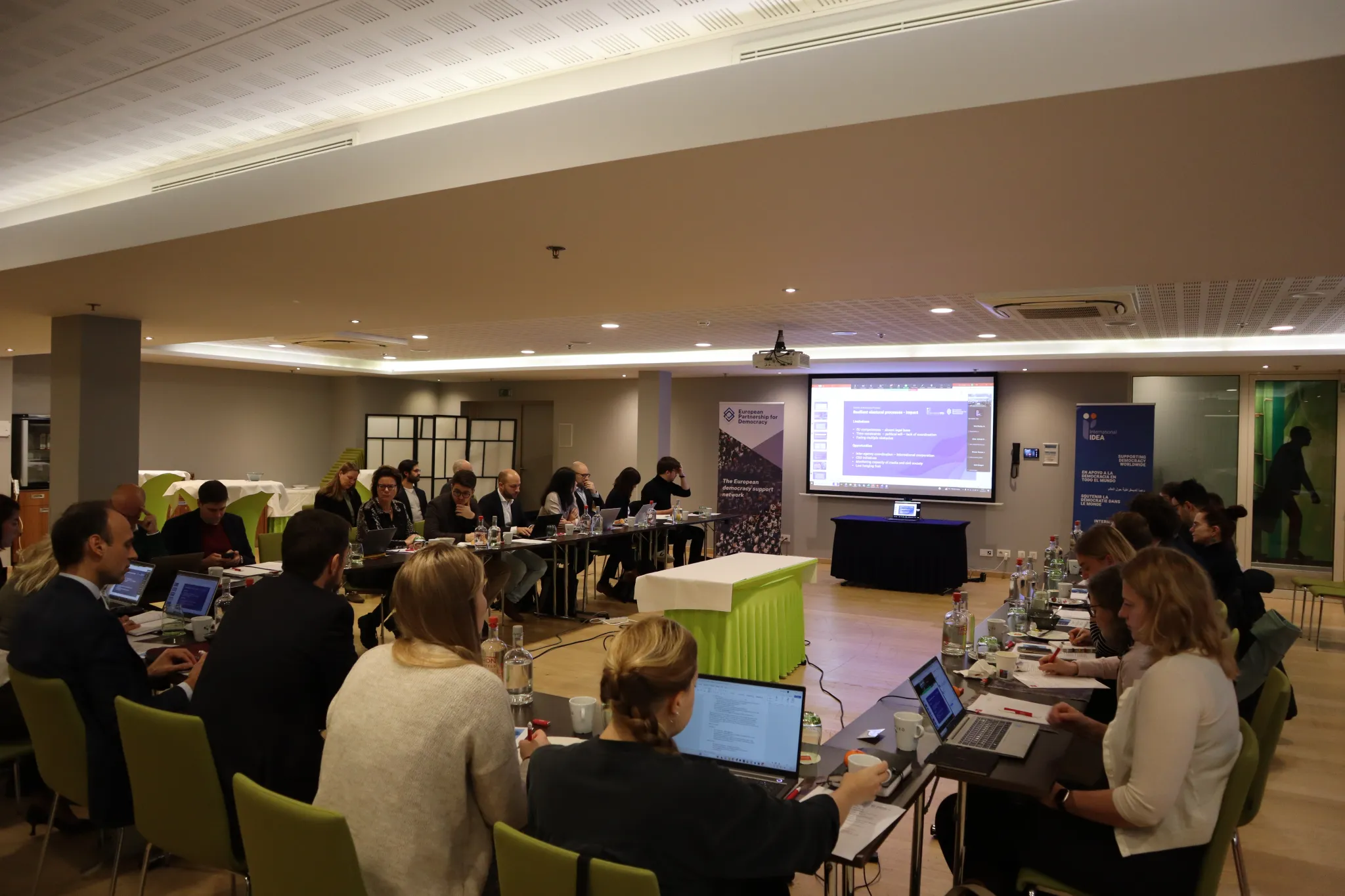International IDEA and partners influence and scrutinize the EU’s Defence of Democracy Package: enhancing transparency and strengthening electoral processes in Europe

The European Commission adopted its Defence of Democracy Package on Tuesday, 12 December 2023. The package encompasses a directive, two recommendations and a communication aiming at shielding European Democracy from malign foreign actors and bolstering democratic resilience from within. The adoption of the package follows 14 months after its announcement by European Commission President Ursula von der Leyen in her 2022 State of the Union.
On 14 December, International IDEA and the European Partnership for Democracy brought together nearly 50 experts from Europe-based civil society organisations, academic institutions, and several International IDEA EU Member states to present and deliberate on the 3 key initiatives of the package.
While the proposal for a directive aiming to harmonise transparency requirements for interest representation from third countries has been extensively debated, the Recommendations on resilient electoral processes and effective participation of citizens have garnered comparatively less attention.
Two Recommendations and a highly deliberated Directive
The Recommendation on resilient electoral processes covers a broad spectrum of topics, addressing issues ranging from ensuring fair campaigning and transparency of online political advertising to protecting electoral infrastructure and information and promoting cyber hygiene measures. Several recommendations are designed to reinforce the European dimension of European Parliament elections.
An integral facet of the Recommendation involves fostering international cooperation among electoral bodies. It outlines plans to strengthen dialogue between national election authorities and enhance collaboration within the European cooperation network on elections (ECNE).
The Recommendation shows that the EU is moving into the direction of standard-setting on democracy and elections, commented International IDEA’s Director for Europe, Sam van der Staak.
Marilyn Neven and Alisa Schaible unpacked the Recommendations on electoral resilience and effective participations of citizens in elections in Europe during the breakfast discussion.
Given the non-binding nature of the Recommendation, its effectiveness relies on the commitment of EU member states, European and national political parties and other stakeholders to heed the call for action outlined in the recommendations. Some recommendations could serve as inspiration for complementary national legislation in areas where EU competence is limited. During discussions, participants explored avenues to stimulate political will and prompt action and coordination. International IDEA highlighted the potential of inter-agency collaboration and contributions from civil society and other actors to monitoring the Recommendation’s impact. Notably, the recommendations on codes of conduct for fostering fair and transparent political campaigning were identified as “low-hanging fruits”, and International IDEA advocated for their facilitation by politically neutral actors to encourage initiatives across the political spectrum.
In the context of the Recommendation on “effective participation and civic space”, the Commission proposes engaging citizens at all levels through deliberative and participatory mechanisms, such as citizen assemblies, consultations, and participatory budgeting. The Commission furthermore endorses the role of digital technologies in facilitating participation, while recognizing that a digital participation gap persists. Therefore, the topics of inclusion and the recognition of special needs are emphasized in the Commission’s recommendation.
The EU acknowledges the critical need to empower citizens with knowledge and skills to critically evaluate information, especially in the era of digital mis- and disinformation. The recommendations underscore the significance of voter education, media literacy, and tools for public consultation as means to strengthen the European democratic culture. Organisations engaged in this field appreciate the thoroughness of the recommendations on participation and deliberative democracy models.
Participants expressed their hope that the two Recommendations will serve as a catalyst for member states and other stakeholders to bolster their legal and oversight frameworks and undertake supportive initiatives.
The Defence of Democracy package also tackles the shifting challenges posed by foreign interference, a topic widely discussed in the media and among civil society. The directive in foreign interest representation seeks to expose malicious foreign interference across the EU. Nevertheless, as highlighted in the discussions, concerns about potential loopholes and the effectiveness of the directive have been raised.
Ken Godfrey, Executive Director of EPD, expressed lingering concerns about the initially rushed process, the geopolitical consequences of the directive, and the inspiration it may inadvertently provide to leaders with autocratic intentions. He also clarified the legislative process that is being initiated within the European Parliament and Council.
Ken Godfrey, Executive Director of the European Partnership for Democracy, expressed concerns over the adopted proposal for a directive on transparency in interest-representation carried out on behalf of third countries.
While the EU's dedication to strengthening democratic principles is commended, the late adoption of the package seriously undermines chances for the initiatives to influence the conduct of the European elections in 2024.
In preparation of the upcoming European parliamentary elections, civil society organisations outlined their key priorities for the months ahead. These include safeguarding civic space against criminalisation and repression, developing tools and mechanisms to enhance politicians’ responsiveness to the demands of the youth, and concentrating efforts on improving transparency, bolstering monitoring and enforcing existing rules to genuinely strengthen European democracy.
Read about the impact of advocacy on the Defence of Democracy package by International IDEA and partners here.
Article written by Marilyn Neven and Alisa Schaible (Carlo-Schmid Fellow and Trainee, Regional Europe Programme)




